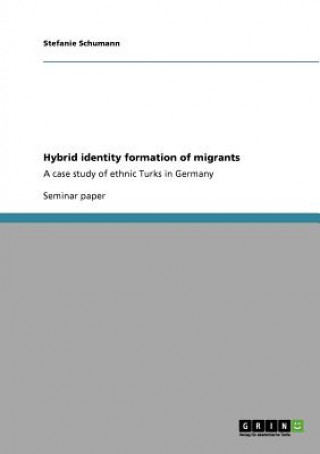
Kód: 01641738
Hybrid identity formation of migrants
Autor Stefanie Schumann
Seminar paper from the year 2011 in the subject Communications - Intercultural Communication, printed single-sided, grade: 1,3, European University Viadrina Frankfurt (Oder) (Kulturwissenschaftliche Fakultät), course: Culture and ... celý popis
- Jazyk:
 Angličtina
Angličtina - Vazba: Brožovaná
- Počet stran: 72
Nakladatelství: Grin Publishing, 2011
- Více informací o knize

Mohlo by se vám také líbit
-

Berserk Deluxe Volume 1
1033 Kč -

Berserk Deluxe Volume 2
1033 Kč -

Haunting Adeline
617 Kč -

Cry Baby Coloring Book
242 Kč -

Berserk Deluxe Volume 3
1138 Kč -

The Official Stardew Valley Cookbook
586 Kč -

Hunting Adeline
633 Kč -

Atomic Habits
464 Kč -

Powerless
259 Kč -

House of Leaves
504 Kč -

Harry Potter and the Prisoner of Azkaban (Minalima Edition)
876 Kč -

Chainsaw Man, Vol. 15
251 Kč -

Gravity Falls Journal 3
401 Kč -

Berserk Deluxe Volume 4
1165 Kč -

White Nights
71 Kč -

JUJUTSU KAISEN V22
239 Kč -

Iron Flame
435 Kč -

Dungeons & Dragons Essentials Kit (D&d Boxed Set)
605 Kč -

Surrounded by Idiots
256 Kč -

Twisted Love
215 Kč -

A Little Life
241 Kč
Dárkový poukaz: Radost zaručena
- Darujte poukaz v libovolné hodnotě a my se postaráme o zbytek.
- Poukaz se vztahuje na celou naši nabídku.
- Elektronický poukaz vytisknete z e-mailu a můžete ihned darovat.
- Platnost poukazu je 12 měsíců od data vystavení.
Více informací o knize Hybrid identity formation of migrants
Nákupem získáte 102 bodů
 Anotace knihy
Anotace knihy
Seminar paper from the year 2011 in the subject Communications - Intercultural Communication, printed single-sided, grade: 1,3, European University Viadrina Frankfurt (Oder) (Kulturwissenschaftliche Fakultät), course: Culture and Ethnicity, language: English, abstract: Within the last few years Germany has been confronted with a vast debate on integration policy. It was not until the year of 2005 that the first national integration law was enacted. Even though Germany has been an immigration country since the 1950s, the necessity of aspecific law framework has been neglected blindly for decades. Already in 2006 about 23% of the children born in Germany had at least one foreign parent (cf. Foroutan & Schäfer, 2009, p.12). The media still talk about the migrant . But it finally has to reach people s minds that there is no clear distinction between the German and the foreigner . In fact, the matter of identity has to be reconsidered. About 18.6% of Germany s overall population possess a migration background (cf. Wippermann & Flaig, 2009, p.3), which signifies, that these individuals face the challenge of cultural contradictory on a daily basis. The permanent negotiation of belonging characterizes the dichotomy between retention of the ethnic and adoption of the German culture. Hence, this phenomenon creates a specific kind of identity, the so called third space , which in the present work I will refer to as hybrid identity. Theterms transnational and hyphenated identity are used synonymously in the relevant literature, but I will apply only to the former name to avoid any confusion. Moreover, this new kind of identity requires rethinking the concept of nationality and raises citizenship issues.The present work shall examine the phenomena of hybrid identity formation in detail: Under which criteria does it emerge and how is the synthesis of two cultural backgrounds depicted in everyday life? After introducing general findings on this topic, I will apply these aspects to the Turkish population in Germany by evaluating several surveys. Even though ethnic Turks do not appear to be the biggest ethnic group in Germany anymore, they represent cultural features including their religion, which makes the observation of their case study more controversial. Data on the German citizenship law will top off the chain of arguments concerning the necessity of nationality for the belonging of hybrid identities.
 Parametry knihy
Parametry knihy
Zařazení knihy Knihy v angličtině Reference, information & interdisciplinary subjects Interdisciplinary studies Communication studies
1019 Kč
- Plný název: Hybrid identity formation of migrants
- Podnázev: A case study of ethnic Turks in Germany
- Autor: Stefanie Schumann
- Jazyk:
 Angličtina
Angličtina - Vazba: Brožovaná
- Počet stran: 72
- EAN: 9783640830763
- ISBN: 3640830768
- ID: 01641738
- Nakladatelství: Grin Publishing
- Hmotnost: 104 g
- Rozměry: 210 × 148 × 4 mm
- Datum vydání: 15. February 2011
Osobní odběr Praha, Brno a 12903 dalších
Copyright ©2008-24 nejlevnejsi-knihy.cz Všechna práva vyhrazenaSoukromíCookies



 Vrácení do měsíce
Vrácení do měsíce 571 999 099 (8-15.30h)
571 999 099 (8-15.30h)